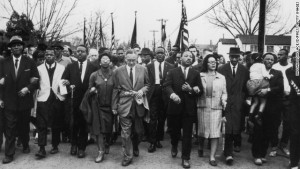 This coming Monday is our national celebration of the life and legacy of Martin Luther King Jr. As I have been reflecting on his work and witness, I am convinced his message is as necessary and prophetic today as it was when he was alive (if not more!).
This coming Monday is our national celebration of the life and legacy of Martin Luther King Jr. As I have been reflecting on his work and witness, I am convinced his message is as necessary and prophetic today as it was when he was alive (if not more!).
We live in a culture that not only glorifies violence, but often celebrates its use against the “enemy” as the truest form of heroism and bravery. While I won’t get into the debate of whether violence is ever justified to preserve life (a much bigger conversation extending far beyond an 700 word blog post), I will say I’m deeply troubled by our assumption that violence is the only way to respond to a real or perceived threat.
Most disturbing is the fact that the majority of Jesus followers in this country have the same assumptions about the “necessary” use of violence as the culture at large. I would argue that an objective observer would not be able to distinguish between the USAmerican Church’s ethic of violence and the ethic of the State or the culture at large. As followers of a God who looked like an enemy-loving Jesus – who sacrificially absorbed violence rather than perpetuating it – we’d be wise to re-examine our assumptions around violence in light of his life and teachings.
Jesus’ take on responding with violence:
“You have heard that it was said, You must love your neighbor and hate your enemy. But I say to you, love your enemies and pray for those who harass you so that you will be acting as children of your Father who is in heaven.” – Matt 5:43-45
“You have heard that it was said, ‘An eye for an eye and a tooth for a tooth.’ But I say to you that you must not oppose those who want to hurt you. If people slap you on your right cheek, you must turn the left cheek to them as well. When they wish to haul you to court and take your shirt, let them have your coat too. When they force you to go one mile, go with them two.” – Matt 5:38-41
After being beat, humiliated, dehumanized and nearly killed, Jesus’ response to violence, “Father, forgive them, for they do not know what they are doing.” – Luke 23:34
“Blessed are the peacemakers, for they will be called children of God.” – Matt 5:9
These passages are often interpreted as Jesus either being a soft pushover or teachings that were not realistic and helpful for establishing a normative, everyday ethic toward violence. The reality is that Jesus was not promoting a passive response to violence, but a dignifying one. A response that would both expose the inhumanity of the abuser’s actions and amplify the dignity of the abused.
Jesus is not just calling us away from the lure of violence, but inviting us toward the necessary, subversive, creative and costly work of peacemaking. Peacemaking isn’t a passive withdrawal from conflict. Peacemaking isn’t embracing the status quo. Peacemaking isn’t euphoric or other worldly.
Peacemaking is a series of actions that move us toward conflict armed with weapons to heal and transform rather than weapons to destroy.
MLK not only took Jesus’ life and teachings seriously, he modeled actions of an alternative response to violence, hatred and injustice. He invited a movement of people to take the hard work of peacemaking seriously by outlining tangible actions that would expose the inhumanity of those abusing power and amplify the humanity, dignity and plight of his black brothers and sisters caught in their wake.
As we celebrate MLK’s life and legacy, may we be reminded to take Jesus’ life and teachings seriously and repent of the ways in which we’ve allowed a culture of violence to hijack our own humanity. Because when we begin to view fellow image bearers as “collateral damage,” we are becoming less human and missing out on an opportunity to join God in the world he is making.
So, rather than embrace an American Sniper spirituality where the Bible brands our violence, may we embrace the spirituality of Selma where the Bible is embodied in nonviolent action. This is not only our task, it is our opportunity. May it be so.